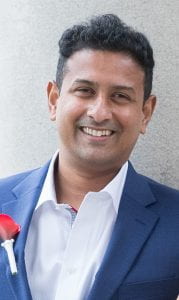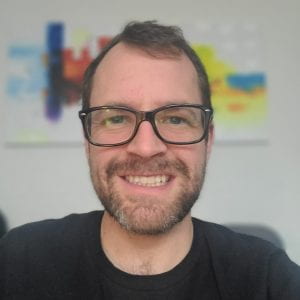Physiology “brown-bag” lunchtime seminars are normally held on selected WEDNESDAYS at noon in Applied Physiology Building, room 1253 (or as indicated). Special seminar dates/times outside of the regular schedule are indicated as such.
Contact Dr. Boris Prilutsky, boris.prilutsky@biosci.gatech.edu, to be considered as a future speaker, added to the e-mail distribution list, if you would like to meet with a speaker, or for other seminar-related inquiries.
For directions: Applied Physiology
SEMINAR: Wednesday, April 20, 2022
Understanding the mesoscale neural representation of a repertoire of human hand movements with translation towards human brain-computer interfaces
Nikhilesh Natraj, PhD
Weill Institute for Neurosciences
University of California, San Francisco
Abstract
The human hand is unique in the animal kingdom for unparalleled dexterity, from complex prehension to fine finger individuation. How does the brain represent such a diverse repertoire of movements? We evaluated mesoscale neural dynamics across the human “grasp network”, using electrocorticography and dimensionality reduction methods, for a repertoire of hand movements. Strikingly, we found that the “grasp network” represented both finger and grasping movements alike. Specifically, the manifold characterizing the multi-areal neural covariance structure was preserved during all movements across this distributed network. In contrast, latent neural dynamics within this manifold were surprisingly specific to movement-type. Aligning latent activity to kinematics further uncovered distinct movement-specific submanifolds despite similarities in synergistic coupling of joints between movements. We thus find that despite preserved neural covariance at the distributed network level, mesoscale dynamics are compartmentalized into discrete movement-specific submanifolds; this discrete mesoscale organization may allow flexible switching between a repertoire of hand movements. We translate these findings for ECoG-based motor brain computer interfaces (BCIs); specifically, we decode discrete motor commands from ECoG activity with high fidelity, and these discrete decoded commands then serve as inputs to robustly control the continuous dynamics of a high-dimensional robotic end-effector.
 |
Bio: Nikhilesh Natraj is currently a postdoctoral research scientist at the Weill Institute for Neurosciences at the University of California, San Francisco. His primary research interests are in understanding large-scale spatiotemporal dynamics of the brain during motor control and translating these findings towards real-world human brain computer interfaces as part of the BRAVO clinical trial at UCSF. He holds a bachelor’s degree in Electrical Engineering from the College of Engineering, Guindy, India, and subsequently traveled to Atlanta to pursue graduate studies at Georgia Tech. At Tech, Nikhilesh obtained a master’s degree in Bioengineering and a doctorate in physiology, focusing on cognitive motor control and neural signal processing. |
Host: Lewis Wheaton, PhD
Time: 12:00 – 1:00 PM
Location: 555 14th street NW, Atlanta 30318; Applied Physiology Building, room 1253; BlueJeans Link
SEMINAR: Wednesday, May 25, 2022
Age-related changes to neuromuscular function
Geoffrey A. Power, PhD
Neuromechanical Performance Research Lab, Department of Human Health and Nutritional Sciences
University of Guelph, Canada
Abstract
Natural adult aging is associated with a loss of muscle mass and neuromuscular function. However, it is often difficult to separate age-related reductions in activity level from natural senescence. Therefore, a choice model to investigate natural adult aging is the Masters Athlete. Masters athletes are often free from some of the confounding factors which accelerate impairments in neuromuscular function. In this talk, I will discuss age-associated morphological and mechanical impairments of the neuromuscular system spanning multiple scales of muscle hierarchy in healthy older adults and masters athletes, with some work on rodents thrown in for good measure.
 |
Bio: Dr. Geoff Power is currently an Associate Professor and director of the Neuromechanical Performance Research Lab at the University of Guelph (about 1 hour from Toronto, Canada). His lab investigates neuromuscular performance across the life span from the cellular to whole human level. Dr. Power completed his undergraduate and MSc degrees at Memorial University of Newfoundland and went on to the University of Western Ontario for a PhD with the Canadian Centre for Activity and Aging where he investigated neuromuscular responses to eccentric contractions, as well as neuroprotective effects of life-long exercise on the number of functioning motor units. Dr. Power then completed a CIHR-Banting funded postdoctoral fellowship under the supervision of Walter Herzog at the University of Calgary investigating age-associated alterations to muscle architecture in a rodent model. Dr. Power’s research is well-funded (NSERC discovery grant, Ontario Early Career Research Award) and he has received young investigator awards from both the Canadian and International Societies for Biomechanics for his work on aging. When not in the lab, he can be found cycling on the trails or back roads around Guelph, BBQing, and of course playing with his young children. |
Hosts : Gregory Sawicki, PhD and Owen Beck, PhD
Time: Wednesday, May 25 at 12:00 – 1:00 PM
BlueJeans Link
